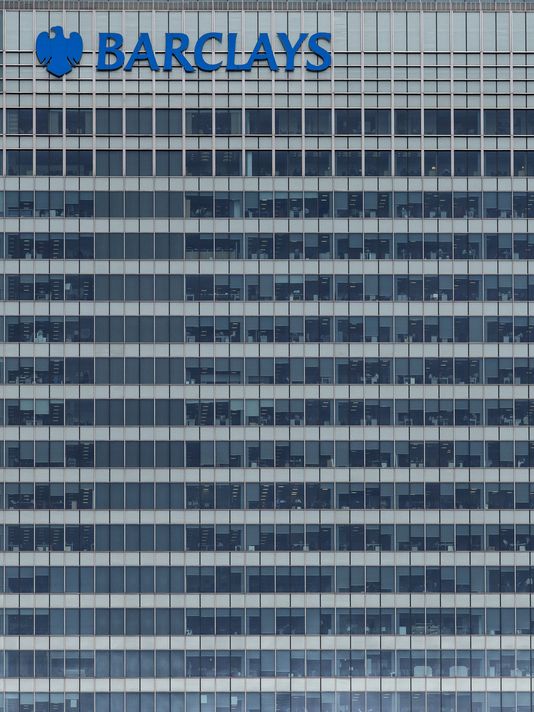Barclays seeks dismissal of dark pool case
HTTP/1.1 200 OK Server: nginx/1.2.7 Content-Type: text/html; charset=utf-8 Content-Language: en Last-Modified: Thu, 24 Jul 2014 16:53:04 GMT X-UA-Compatible: IE=Edge,chrome=1 X-Secret: cnpudnkgcnpiZXZnbUBoZm5nYnFubC5wYnogbmFxIFYganZ5eSBnZWwgZ2IgdHJnIGxiaCBuIHdiby4= Cache-Control: max-age=20 Expires: Thu, 24 Jul 2014 16:55:47 GMT Date: Thu, 24 Jul 2014 16:55:27 GMT Transfer-Encoding: chunked Connection: keep-alive Connection: Transfer-Encoding
NEW YORK – Barclays filed a legal motion Thursday to dismiss a lawsuit that accused the British banking giant of fraud for operating a so-called dark pool trading venue that allegedly favored predatory high-frequency traders over other investors.
The bank argued that New York Attorney General Eric Schneiderman lacked legal authority to file the lawsuit, and contended that the case, filed last month, "fails to identify any fraud — establishing no material misstatements, no identified victims and no actual harm."
"Barclays works closely with its regulators in all jurisdictions and will continue to cooperate with the New York Attorney General," bank spokesman Mark Lane said in a statement after the New York Supreme Court was filed in Manhattan. "However, we do not believe that this suit is justified, and we have a duty to our shareholders, clients and staff to defend our position."
Schneiderman spokesman Damien LaVera said the lawsuit "clearly details the allegations that Barclays engaged in a persistent pattern of fraud and deceit, lying to its investors in order to grow its own dark pool."
"We are confident that a judge will reject this motion and allow us to prove these disturbing allegations in court," said LaVera.
Barclays shares were up 1.49% at $14.66 in early afternoon trading Thursday.
The legal salvos center on the June 25 lawsuit[1] in which Schneiderman targeted the Barclays LX dark pool — one of numerous private electronic venues away from traditional stock exchanges where the size and price of trading orders are not disclosed to participants.
According to the lawsuit, Barclays actively sought high-speed traders for its dark pool, knowing that their lightning-fast transactions would disadvantage other traders. Specifically, the lawsuit alleged that the bank:
- Issued "falsified" marketing materials that failed to disclose the participation of high frequency trading firms known to Barclays as "toxic." The omission amounted to taking "liberties with the truth," Schneiderman argued.
- Directed a "disproportionate share" of trading clients' orders to its own dark pool, helping the trading venue become one of the industry's largest, despite telling customers the pool would not get any favoritism.
- Gave high-frequency trading firms information about the identity and activity of other traders, and charged the firms "virtually nothing" to trade in the dark pool.
Barclays' dismissal motion said the complaint was "based on clear and substantial factual errors" the bank would rebut if the case were allowed to proceed.
But the bank argued the case should be thrown out of court because it was filed under New York State's Martin Act, which Barclays said "is limited to actions for fraud in the purchase or sale of 'securities,' " and does not cover trading platforms or other actions related to finance.
Barclays said that allowing the case to proceed would pose a conflict with the Securities and Exchange Commission's legal authority to develop and enforce national regulations for dark pools and other alternative trading platforms.
Even if Schneiderman has legal authority to pursue the lawsuit, the bank said his court complaint "does not allege which (if any) of Barclays' highly sophisticated clients saw these supposed misstatements, when (if ever) they saw them ... and whether those clients were harmed by them."
The bank also argued that Schneiderman's lawsuit wrongly seeks damages and restitution on behalf of people of the State of New York "without alleging that the people — let alone any LX clients — actually suffered any harm."
Barclays U.S.-based dark pool handled more than 282 million trades during the week of June 2, ranking it second among competing alternative trading systems, according to data from the Financial Industry Regulatory Authority, a Wall Street self regulator. The data showed the trading volume dropped to roughly 66.4 million shares, a 12th-place ranking, during the week of June 30th, after Schneiderman filed the lawsuit
Separately, Barclays executives testified at a Capitol Hill hearing[2] Tuesday over a Senate subcommittee report[3] that showed the bank profited from complex financial transactions that enabled hedge funds to avoid billions of dollars in taxes. They said the transactions complied with all tax laws and regulations.
Read or Share this story: http://usat.ly/1rDNsy4
References
- ^ http://www.usatoday.com/story/money/business/2014/06/25/ny-ag-lawsuit-barclays/11365909/ (rssfeeds.usatoday.com)
- ^ http://www.usatoday.com/story/money/business/2014/07/22/senate-hearing-hedge-fund-taxes/12984733/ (rssfeeds.usatoday.com)
- ^ http://file///C:/Users/kmccoy/Downloads/REPORT-Abuse of Structured Financial Products (Basket Options) FINAL(7-21-14).pdf (file)










